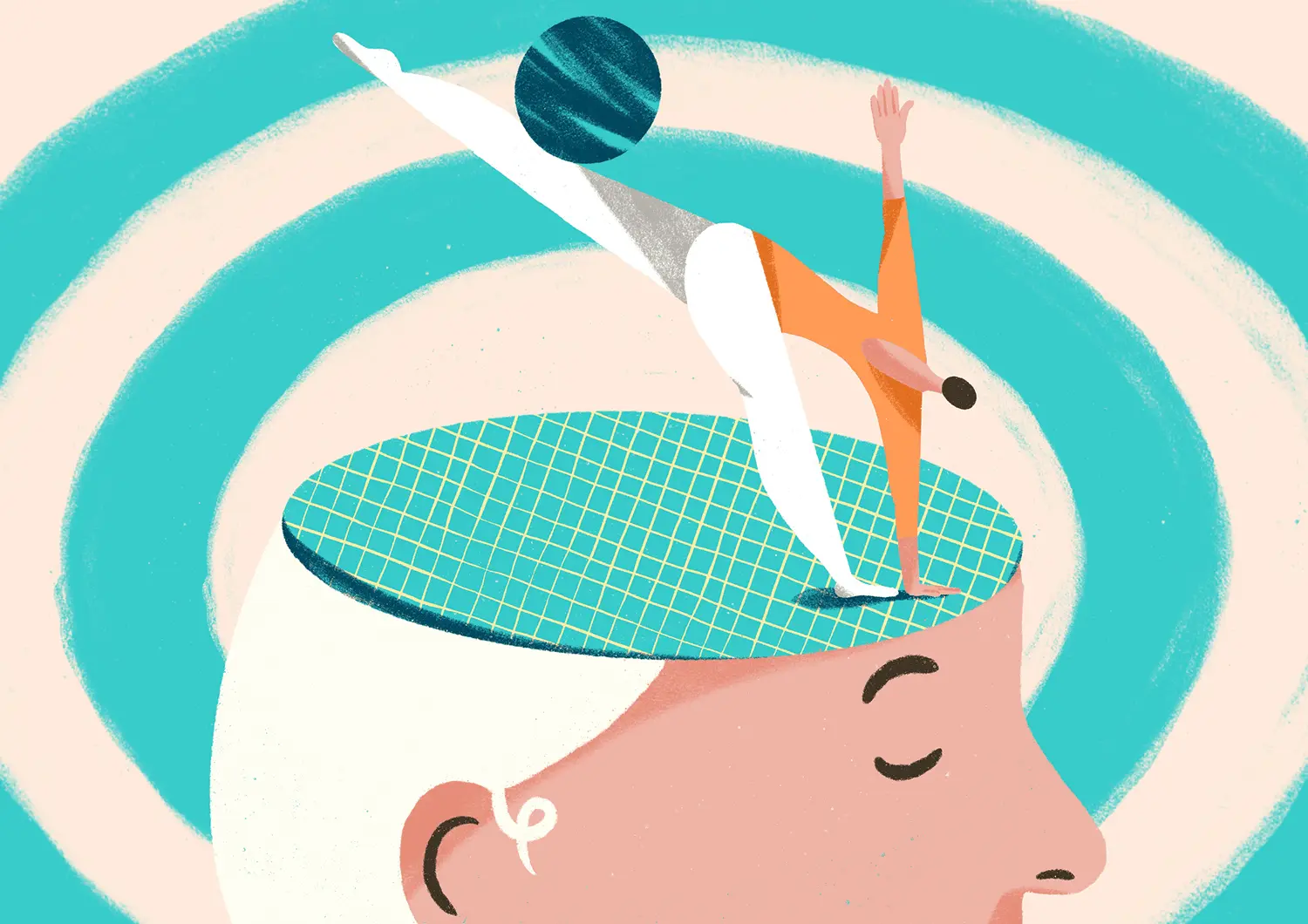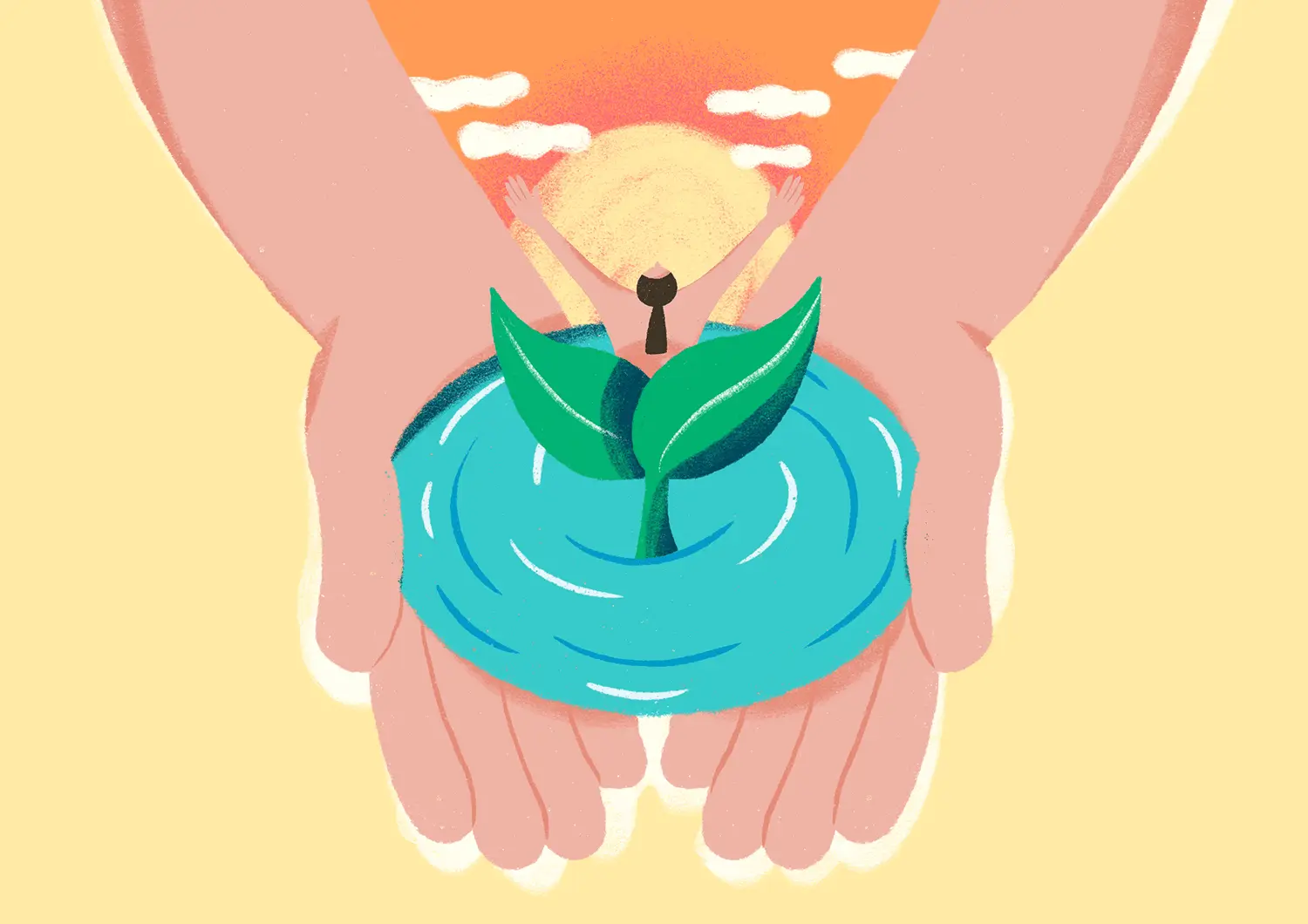
The year 2023 is now upon us. Looking back at last year's journal, we may have set plenty of goals. I have set such goals as drinking 8 glasses of water per day, exercising every week, and overcoming excessive self-criticism. Although some goals may not pan out as expected, it’s still good to say "not yet" to ourselves.
The concept of "not yet" is not only about self-compassion, but also self-affirmation, which is a core element of a growth mindset. Carol Dweck, Professor of Psychology at Stanford University, suggested two major types of mindsets: growth mindset and fixed mindset.
People with a growth mindset believe that intelligence, abilities, or personality can be cultivated with effort. They are comparatively more willing to learn, accept challenges, and embrace opportunities for development; they do not give up easily even in the face of failure as they see failure as an invitation to improve, others’ successes as learning opportunities; they proudly embrace the idea that “I am not afraid of storms, for I am learning to sail my ship.”
In contrast, people with a fixed mindset believe that intelligence, abilities, or personality are innate and unchangeable, that even with effort cannot be changed or improved. As they believe that abilities are fixed, setbacks dent their belief in their abilities and as proof of their incompetence. Thus, they tend to avoid challenges and give up more easily; they are relatively more defensive and may see advice as criticism and other people's success as a threat.
Research found that people with a growth mindset have a higher error positivity component (Pe); they are more aware of errors, willing to reflect on them and analyze the causes so that they can correct them accurately in the future.

Self-belief: the magic of believing
According to Carol Dweck, "How far you go in life has more to do with your mindset than with your intelligence" is the cornerstone of growth mindset. Though this may not be absolutely true, shifting from a fixed mindset to a growth mindset can definitely make a difference.
To understand the impact of growth mindset, researchers asked a group of art students to complete a reading on growth mindset and a reflective exercise that fosters growth mindset before enrolling in the college. This group of students was required to complete mathematics and science courses under the curriculum.
The results showed that among the students who had no interest in math and science before they enrolled, those who did the growth mindset induction exercise showed an increase in interest and performance in both subjects; which reflected that by adjusting their mindset, informing them that interests and abilities could be fostered, they became more engaged and their grades improved.
The mindset determines your story, and it can be written by yourself, thanks to the neuroplasticity of the brain. We may observe our thoughts and behaviors more often, especially when we have strong emotions - pay attention to whether your thoughts align with your values. If we recognize that we are in a fixed mindset mode, this is the first step to make a change; we can observe the things that trigger our fixed mindset mode - perhaps when we face doubts and challenges, or when comparing ourselves to others. We all are different, so do our trigger points.
After recognizing the thoughts and emotions, you may tell yourself, "I have room for improvement," and ask "What and how can I change now?” Look for the good in every situation, seek the valuable lesson in every setback, search for solutions to problems.
Better than you were yesterday
If we have not attained a particular goal at the present time, we can learn to accept it with kindness and generosity. This is not an excuse, but a way to empower yourself with faith to try again.
For example, imagine your KPIs failed this month, what kind of thoughts might come up? "I can't do it", or ''why couldn't I do it?'' Do you examine the discrepancy between your performance and your goal and look into possible reasons? Is it due to insufficient time, lack of skills, you are occupied with other responsibilities, or you are experiencing burnout, or something else?
The key to a growth mindset is to accept your limitations with courage and compassion when facing setbacks or challenges, and to tell yourself it's OK to have moments of setback. Then, actively think about ways to solve the problem at hand, correct mistakes and learn from them, progress little by little every time.
Conversely, when achieving success, you may analyze the factors and make use of them in the future. By clearly identifying the meaning of the tasks you are doing, you can gain a sense of purpose.
Developing a growth mindset in the workplace
Developing a growth mindset can build our resilience in our daily lives; developing a culture of growth mindset in the workplace can promote long-term corporate development and sustainability. Research showed that growth mindset leads to positive development in -
- employees at the individual level, e.g., self-awareness, job engagement and satisfaction, creativity and openness
- colleagues at the collaborative level, e.g., supervisee-supervisor relationship, mutual trust of employees, and conflict management
- companies at the macro level, e.g. employees' sense of belonging
The study further indicated that human resources strategies can strengthen the growth mindset of an organization, including training and coaching, leadership development, and performance evaluation mechanisms.
- Training and coaching: Integrating the concept of growth mindset into training can help employees to value trial and error, encourage them to step out of their comfort zone to develop different skills, and contribute to increasing levels of engagement in creative activities as well as encouraging diversity in the organization. Managers can be accountable for holding consistent feedback sessions as growth mindset oriented coaching feedback boosts employees’ motivation and ability to perform.
- Leadership development: Reflective practices to develop leaders’ growth mindset beliefs enable leaders to be more accustomed to deeper reflection, more conscious of avoiding stereotypes and showing cultural inclusivity. In turn, it could increase employees’ growth mindset and openness to organizational positive change. Research showed that coaches' prejudice toward women’s golf ability is correlated with lower female athletes’ motivation and player performance. By priming growth mindset, it effectively reduces coaches’ bias, leading to an increased performance and athlete participation.
- Performance evaluation mechanisms: By designing performance evaluation rubrics that model growth mindset, performance evaluation can reduce bias and assumptions. Managers can also be reminded that employee skills can be improved with practice and constructive feedback.
A growth mindset not only gives you more possibilities, it also can lift up others. Let's think about how you want to be this year and live it out heartily.

References:
Han, S. J., & Stieha, V. (2020). Growth Mindset for Human Resource Development: A Scoping Review of the Literature with Recommended Interventions. Human Resource Development Review, 19(3), 309-331. https://doi.org/10.1177/1534484320939739
Canning, E. A., Murphy, M. C., Emerson, K. T. U., Chatman, J. A., Dweck, C. S., & Kray, L. J. (2020). Cultures of Genius at Work: Organizational Mindsets Predict Cultural Norms, Trust, and Commitment. Personality & social psychology bulletin, 46(4), 626–642. https://doi.org/10.1177/0146167219872473
O’Keefe, P. A., Lee, H. Y., & Chen, P. (2021). Changing Students’ Beliefs About Learning Can Unveil Their Potential. Policy Insights from the Behavioral and Brain Sciences, 8(1), 84–91. https://doi.org/10.1177/2372732220984173
Yeager, D.S., Hanselman, P., Walton, G.M. et al. A national experiment reveals where a growth mindset improves achievement. Nature 573, 364–369 (2019). https://doi.org/10.1038/s41586-019-1466-y
Moser, J. S., Schroder, H. S., Heeter, C., Moran, T. P., & Lee, Y. H. (2011). Mind your errors: evidence for a neural mechanism linking growth mind-set to adaptive posterror adjustments. Psychological science, 22(12), 1484–1489. https://doi.org/10.1177/0956797611419520
Nussbaum, A. D., & Dweck, C. S. (2008). Defensiveness versus remediation: Self-theories and modes of self-esteem maintenance. Personality and Social Psychology Bulletin, 34(5), 599–612. https://doi.org/10.1177/0146167207312960
Blackwell, L. S., Trzesniewski, K. H., & Dweck, C. S. (2007). Implicit theories of intelligence predict achievement across an adolescent transition: a longitudinal study and an intervention. Child development, 78(1), 246–263. https://doi.org/10.1111/j.1467-8624.2007.00995.x

